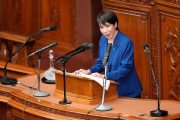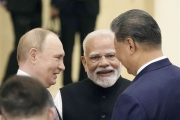
On January 13, William Lai Ching-te of Taiwan’s Democratic Progressive Party (DPP) won the presidential election, although with a plurality instead of the outright majority of votes it obtained in 2020, giving the DPP an unprecedented third consecutive term in office.
Nonetheless, the DPP lost the legislative majority it had held for the past eight years, albeit by a much smaller margin than initially expected.
Kuomintang (KMT), the largest opposition party in Taiwan’s Legislative Yuan, obtained one more seat than the DPP — 52 to the DPP’s 51 — in this election, becoming the largest party in the chamber.
Another eight seats in the 113-seat chamber went to the relatively new Taiwan People’s Party (TPP) led by previous Taipei mayor Ko Wen-je and two independent candidates.
The election results mean that Lai will face a hung parliament, the first in Taiwan since 2008 after no parties received a majority in the concurrent legislative polls. Hence, while the DPP’s victory indicates the first time a party has won a third consecutive term since direct presidential elections started in Taiwan in 1996, the hung parliament could make it more challenging for Lai to push through new laws. Key laws could include expenditure to buy arms from the United States and election promises for labor pension reform and housing access.
After the results, some voters told the Channel News Asia (CNA) news outlet that they were concerned about three parties contesting for influence in the legislature, making it harder for the DPP to govern over the next four years.
“I feel the results are acceptable but not very satisfactory. Like I scored 75 points on a test but made many errors,” said Taipei voter Mr Lee Guan-der, 31.
Project manager Chen Chen-en, 30, who works in Taichung, said that the issue he was most worried about was national security.
He was concerned that the government’s national defense budget would not be able to pass without a parliamentary majority for the ruling party.
“I feel more pessimistic,” he said. “I think things will not go as smoothly as they have in these past four years.”
A 52-year-old business owner, who only wanted to be known as Linda, said she did not see any hope for Taiwan from the results.
“Many policy decisions do not take small- and medium-sized enterprises like ours into account. The economy has been so bad recently and costs have continued to grow, which puts a lot of pressure on us,” she said.
“It comes back to the feeling of not being able to see the future. It will only get worse and worse, more and more corruption.”
Admitting the DPP’s poorer performance in the legislative elections, Lai declared in his speech that it “means that we did not work hard enough, and there are areas where we must humbly review and look back on.”
“The elections have told us that the people expect an effective government, as well as strong checks and balances. We fully understand and respect these opinions from the public,” he added.
Lai also vowed to carefully examine the policies and positions of his two rival candidates, “as long as they bring benefit to the people and further our national development, they will be incorporated into my policy framework.”
Other promises the president-elect made included harnessing talent from different political parties for personnel appointments, prioritizing issues that enjoy consensus between political parties and raising public participation on key and urgent issues.
Also, during his victory speech delivered at a press conference at 8:30 p.m. January 13, Lai said, “Under the principles of dignity and parity, we will use exchanges to replace obstructionism, dialogue to replace confrontation, and confidently pursue exchanges and cooperation with China. This furthers the wellbeing of people on both sides of the Taiwan Strait and achieves our objective of peace and common prosperity.”
In a statement issued after Lai won the elections, Beijing’s Taiwan Affairs Office spokesperson Chen Binhua said in a statement that the vote “will not impede the inevitable trend of China’s reunification,” according to state-controlled news agency Xinhua.
The outcome of the vote, Chen said, showed that the DPP “cannot represent the mainstream public opinion on the island.”
Chen also added that the vote “will not change the basic landscape and development trend of cross-strait relations.”
Beijing’s stance on “realizing national reunification remains consistent, and our determination is as firm as rock,” he said, adding that “Taiwan is China’s Taiwan.”
He said Beijing “firmly opposes the separatist activities aimed at ‘Taiwan independence’ as well as foreign interference.”
Both Beijing and Washington watched Taiwan’s election closely as both powers compete for influence in the strategically vital region.
In a New Year’s address, Chinese authoritarian leader Xi Jinping had said the “unification” of Taiwan with China was “inevitable.”
Before the elections on January 13, Beijing cautioned that Lai was a “severe danger” who would undermine peace by following the “evil path” of independence.
Taiwan’s Foreign Affairs Ministry issued a statement later, urging Beijing to “respect the election results, face reality and give up oppression against Taiwan.”
“Only by doing so can positive cross-strait interactions return to the right track as soon as possible,” the ministry elaborated.
Prior to the elections on January 13, China imposed restrictions on Taiwanese exports of petroleum products to the mainland covered by the cross-strait Economic Cooperation Framework Agreement to ramp up pressure on Taiwan.
Additionally, the Chinese military continued its activity near Taiwan, launching a satellite and several surveillance balloons. There were also reports on alleged Chinese pressure on tycoon Terry Kuo to withdraw his candidacy in the presidential race to compel an electoral alliance between the TPP and KMT, which came on top of reported efforts to discredit the DPP on social media.
Moreover, security and political observers do not expect Beijing to resume official dialogue with Taiwan under Lai. Formal communications were stopped in 2016 after the DPP’s Tsai Ing-wen won the presidency.
Observers widely expect China to continue its “coercive approach” towards Taiwan, which it sees as part of its territory to be unified with the mainland — by force if necessary.
Beijing could enforce measures including economic sanctions as well as more frequent incursions into Taiwan’s Air Defense Identification Zone (ADIZ), said Dr. Arthur Ding of Taiwan’s National Chengchi University (NCCU).
Dr. Ding was speaking at a post-election outlook media session organized by NCCU’s Election Study Center, think tank The Prospect Foundation, and Taiwan’s Ministry of Foreign Affairs on January 14.
There were more than 1,600 Chinese incursions in 2023, based on figures by the U.S.-based Missile Defense Advocacy Alliance.
“China will most likely continue with its existing policies of pressuring Taiwan militarily and economically to abandon its independence-learning activities,” Dr. Huang Chin-Hao, an associate professor of political science at the National University of Singapore (NUS), told CNA News.
“It may wait and see the lineup of Lai’s cabinet, how the legislative politics and potential coalition shake out, and the content of Lai’s inauguration speech to reassess whether a new policy toward Taiwan is warranted,” said Dr. Huang, who is also author of Power and Restraint in China’s Rise. That being said, the likelihood of an “all-out invasion” by China in the next several years is low, claimed Dr. Ding.




